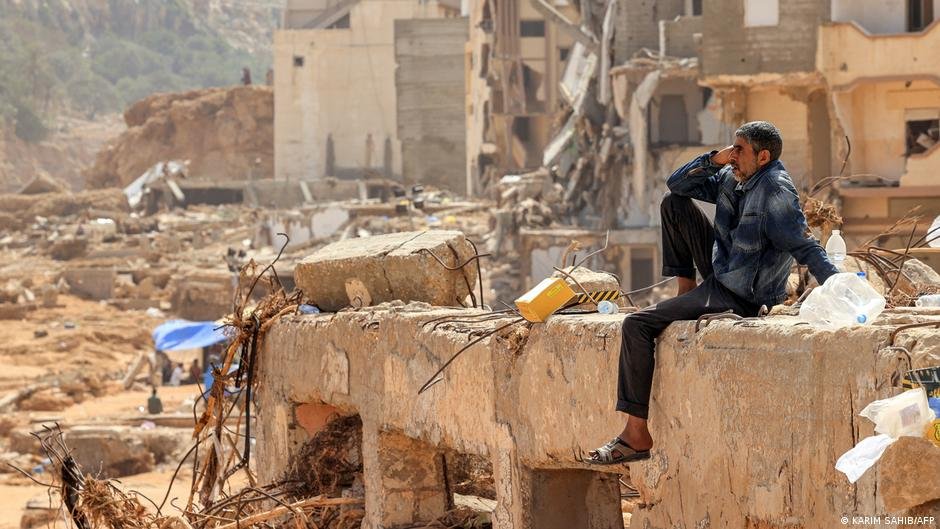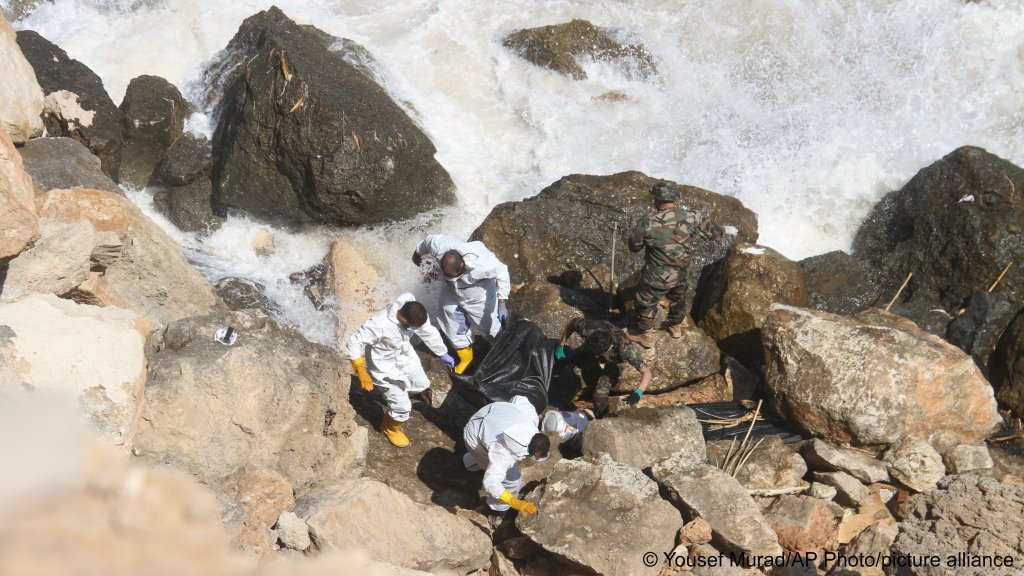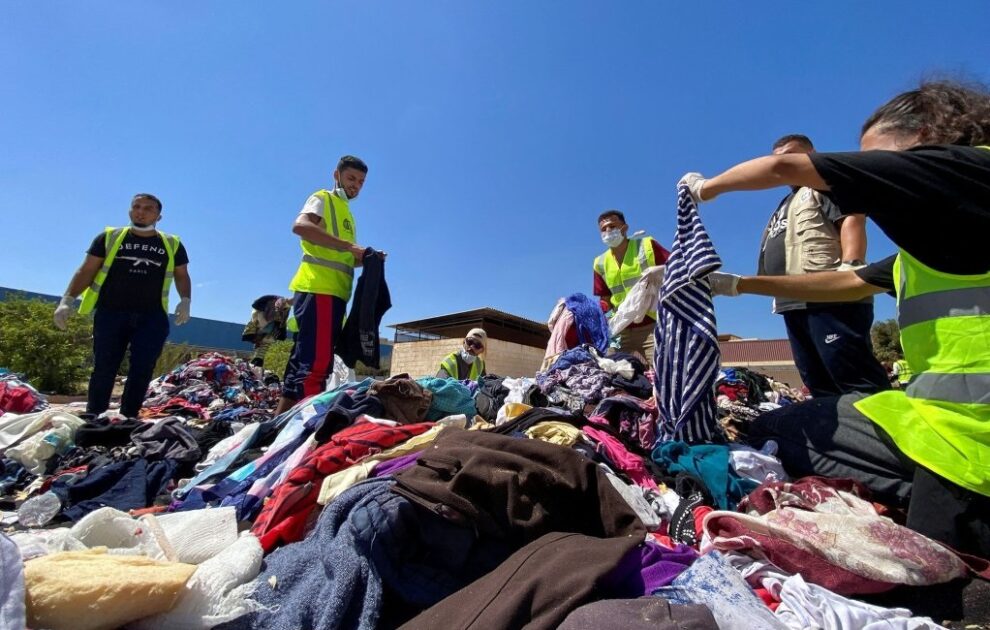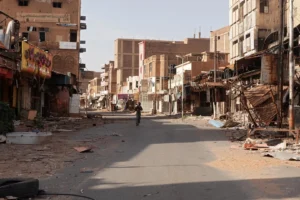Just over two months ago, Storm Daniel unleashed floods, resulting in widespread devastation in Libya. More than 4,000 people were confirmed dead, and as many as 8,500 reported missing. Among them were hundreds, perhaps thousands of migrants, many of whom are still waiting for news of their loved ones.
The floods struck Libya in September. By the beginning of October, the World Health Organization confirmed that at least 4,333 people had been confirmed dead, and as many as 8,500 people were missing.
It is still unknown exactly how many migrants and migrant workers may have died in the floods in Libya, but towards the end of September, Deutsche Welle reported that according to the UN, around 10% of the flood’s victims could have been migrants. Many of them came originally from Egypt, Syria and the Palestinian Territories.
Many Egyptians for instance worked in construction in Libya. One villager from the central Egyptian province of Beni Suef told DW in September that the loss of life in the village was “immense. The village cannot bear it. There is not a single household here that has not felt a loss.”
In September, Libya had identified at least 250 Egyptians who died in the floods, and around half of those came from one village in Beni Suef called Nazlet el-Sharif. At that time, Aisha al-Imam had not had word from her eldest son who had been working in Libya. “All I have left is grief,” she told DW.

Still missing
At the time of the floods, there were around 2,000 Egyptian nationals working in Derna, one of the coastal cities hardest hit by the floods in Libya. A large percentage of them went missing in the floods, reported DW.
Prior to the flooding, the UN Migration Agency IOM estimated that there were at least 230,000 migrants living in eastern Libya. Many more, hoping to travel to Europe, or in illegal detention centers around the country, may not have ever been registered in these official estimates.
Just a week after the flooding, the Secretariat for the Sudanese working abroad confirmed that 276 Sudanese had died in the floods, and more than 110 Syrians were confirmed dead by the UK-based Syrian Observatory for Human Rights. Six Bangladeshis were identified as having died in the floods, and at least 250 Egyptians.
Also read: Videos of migrants being tortured in Libya published on social media
The organization Human Rights Watch said it was “very concerned about the wellbeing of migrants and asylum seekers in Libya [in general] and especially those impacted by the flooding in eastern Libya,” Hanan Salah, a senior Libya researcher at HRW told DW.
No news
Because of the devastation wreaked by the floods, Salah said that many migrants had difficulty informing their families of their whereabouts.
One of those still waiting for news is a Palestinian Sana’a, whose brother Lu’ay Afifi, his wife and two daughters lived in Derna before the floods. Sana’a told the British newspaper The Guardian, that she is still hoping to hear from them. “I have faith that my brother and his family survived this catastrophe,” Sana’a says, although the Guardian’s reporter says her voice “lacks conviction.”
Sana’a says that she sent her husband and son to her brother’s home and confirms there was “nothing left of it.” She says she has added their names to a list being compiled by a committee in the Palestinian consulate in Benghazi. There are at least another 65 Palestinians whose names appear on that list.
Her brother, explains Sana’a worked in construction.
Undocumented migrants face even more challenges
Another problem for families of migrants who may be missing or dead is they have received no compensation. According to Ibrahim Jumaa, a member of the crisis committee at the Palestinian consulate in Derna, the Libyan government has begun to give compensation to the families of Libyan citizens affected by the flood. They are receiving around 50,000 dinars (around €9,500) per family, but the families of migrants have received nothing as yet.
The situation is especially difficult for the families of undocumented migrants in Libya. First of all, they often don’t appear on any official list, and second of all, if they have been lost in the flood, the money they had been sending home, often a lifeline for their families, will have dried up.
Some Egyptian families, whose loved ones haven’t yet surfaced following the floods, told the Guardian they had been circulating their photos on social media, but had not yet received any leads. They have also talked to the Red Crescent and the Egyptian foreign ministry, but have not received any news.
In September, according to the communications director of the Tobruk medical center, 145 bodies were sent back to Egypt. Hundreds more were buried in Libya. The Libyan authorities collected DNA samples from those buried in Libya, and they are now seeking to identify the bodies they buried.

Livelihoods swept away
The Guardian states that Egypt’s Ministry of Social Solidarity has given families of those injured in the floods compensation of about 25,000 Egyptian pounds (around €743.89). If a family member was confirmed dead, then they reportedly have or will receive around four times as much, or 100,000 Egyptian pounds (around €2,900).
Some families told the Guardian they have not yet received anything. Mahmoud al-Kadeki, a political analyst and researcher at the University of Benghazi said that most undocumented migrants, even when caught up in the floods, will have fallen through the cracks. “Being unregistered with the state means they lose their eligibility for any rights guaranteed by the legal framework.”
One undocumented migrant from Egypt, who paid smugglers to enter Libya, said he had been earning well before the storm. He told the Guardian that after the storm, the workshop where he had worked with two other Egyptians was destroyed, all their tools and their materials were washed away by the storm.
Difficulty of working in Libya
The man asked his employer for some of the compensation being paid to Libyan citizens after the storm, but the man refused, saying he had incurred such huge losses himself, reports the Guardian. The man, who wished to remain anonymous, says he and his companions are grateful to be alive. On realizing that their livelihoods had been wiped out by the storm, they sought to travel to a bigger Libyan city.
The man told the Guardian:”With all our chances of work in Derna now gone, we sought to go to one of the bigger cities, Benghazi, or Al Bayda, but we wanted to leave the city without being arrested.”
The HRW researcher Hanan Salah, admitted to InfoMigrants that trying to track people on the move is tricky. “If you ‘re on the move and you happen to be in this part of the country that is severely affected, where telephone and internet lines are down, it will be even more difficult for international organizations and everyone else to know where you are,” said Salah.
Source : Info Migrant











Add Comment